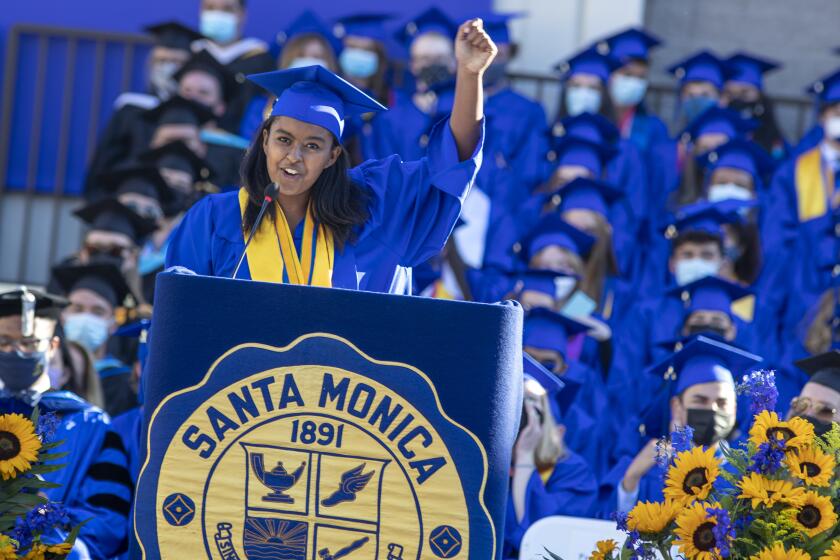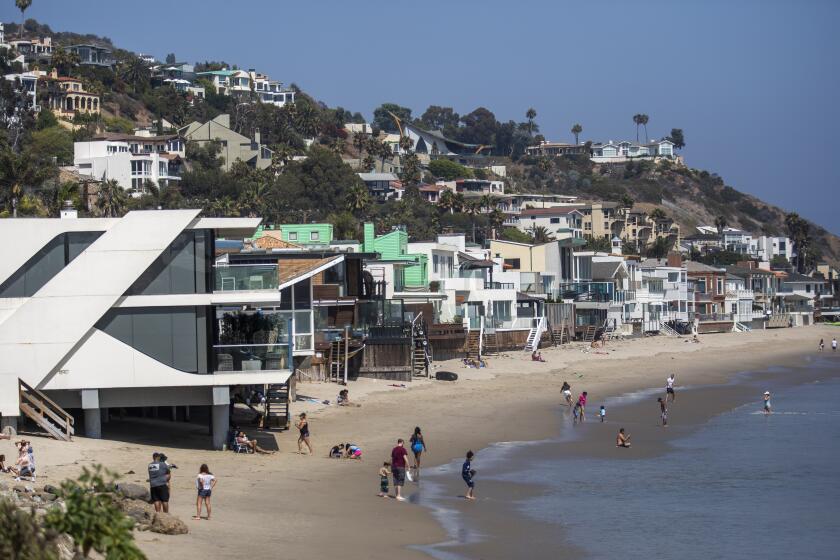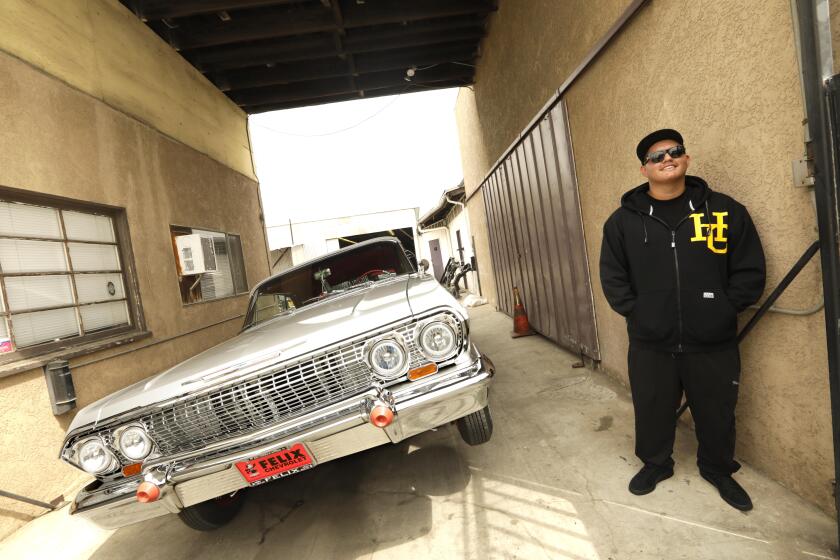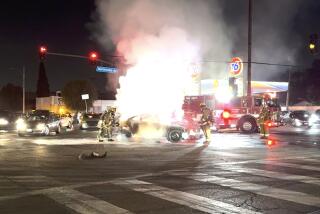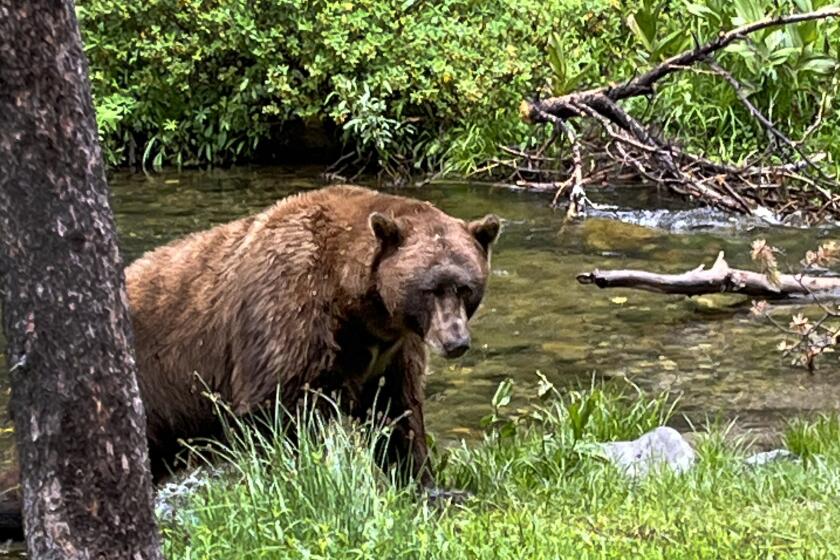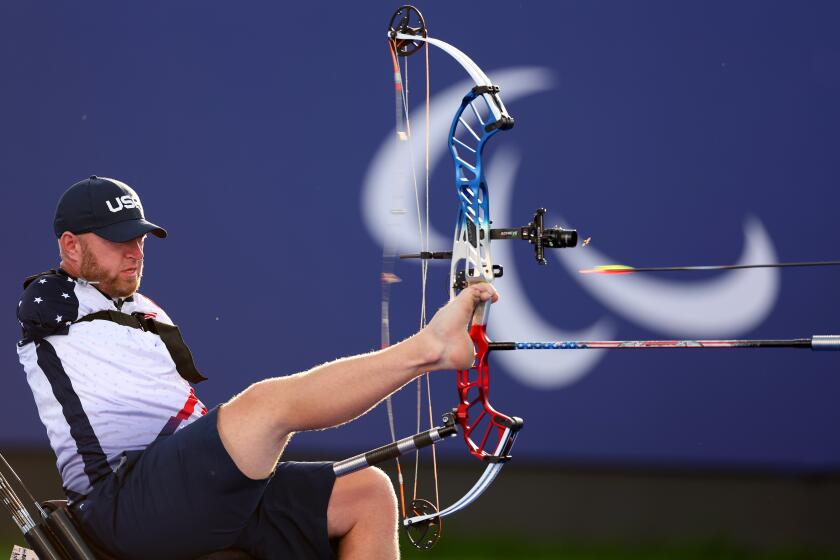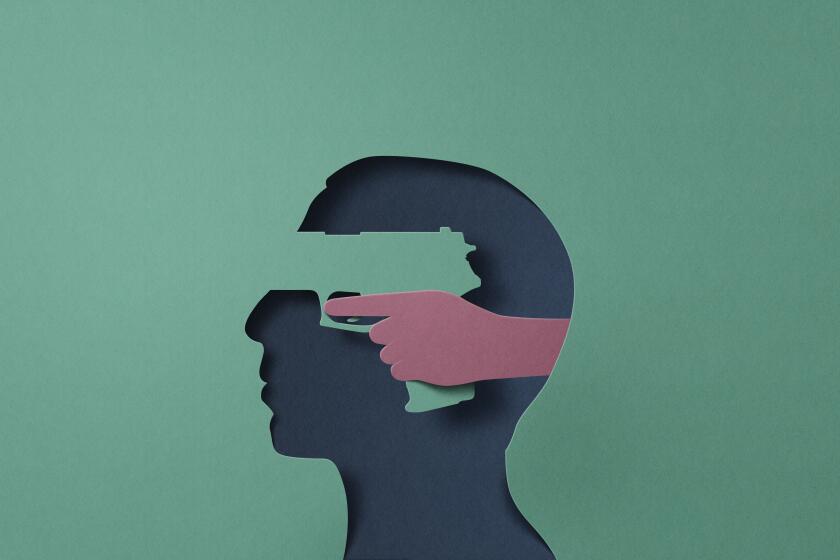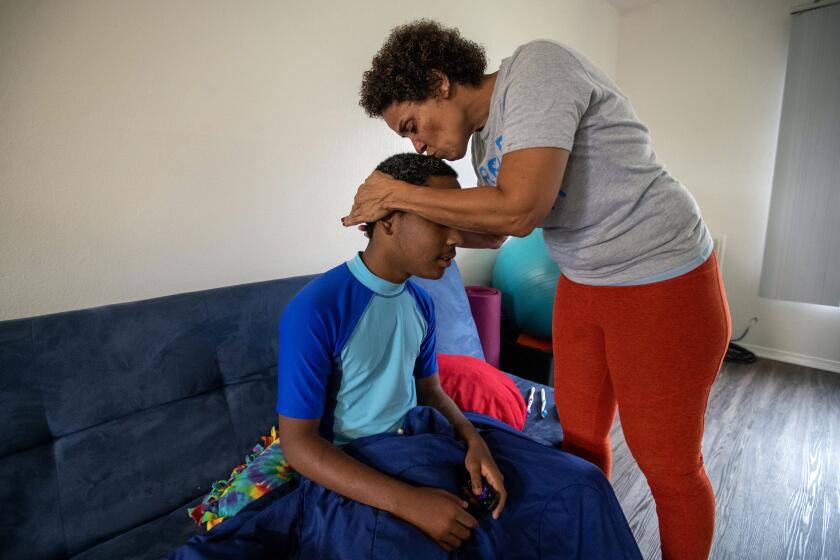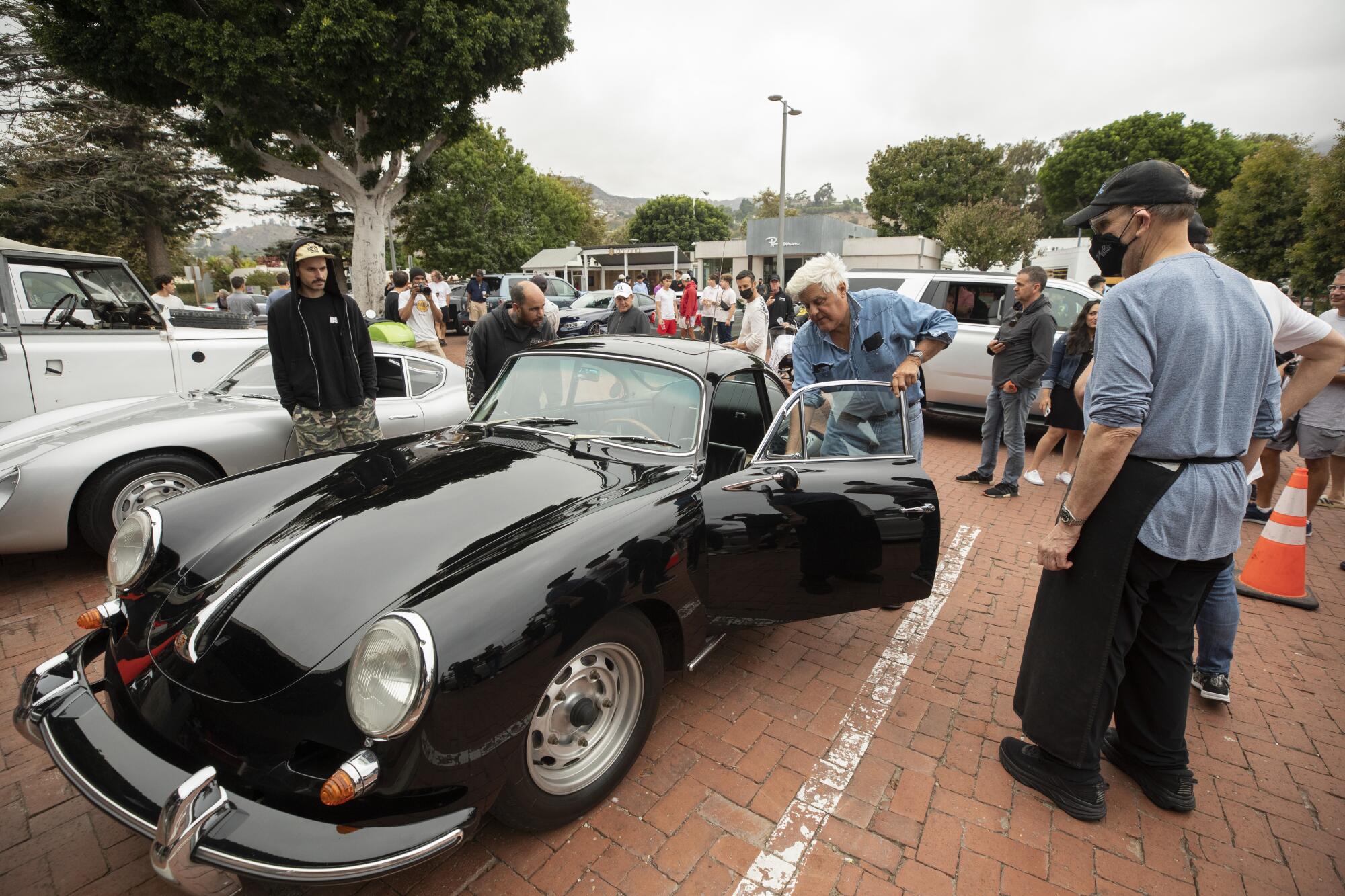
It’s 9 a.m. on a recent Sunday, and at the Malibu Village shopping mall, the barricades have gone up.
Stuck behind the parking-lot blockade, Bill Miller stands on the patio of his Malibu Kitchen restaurant, empty except for two diners having breakfast.
“Believe it or not,” he says, without seeming to believe it himself, “this place used to be full at this hour. This was my busiest time on a Sunday.”
In front of the restaurant, orange cones block four parking places. Miller’s longtime customer Spike Feresten has texted to say he needs those for himself and three others this morning.
If they can get in.
One is reserved for Jay Leno, who will be arriving in a very rare Porsche 356 4-Cam, which he’ll park next to a similarly rare Porsche Zagato 356 Carrera Coupe driven by Feresten. Nearby, Paul Zuckerman, an attorney and Feresten’s partner in his podcast, “Spike’s Car Radio,” will park his beautifully restored 1961 Mercedes 300SL beside an even more beautiful 1957 Mercedes 300SL driven by Bruce Meyer, co-founder of the Petersen Automotive Museum.
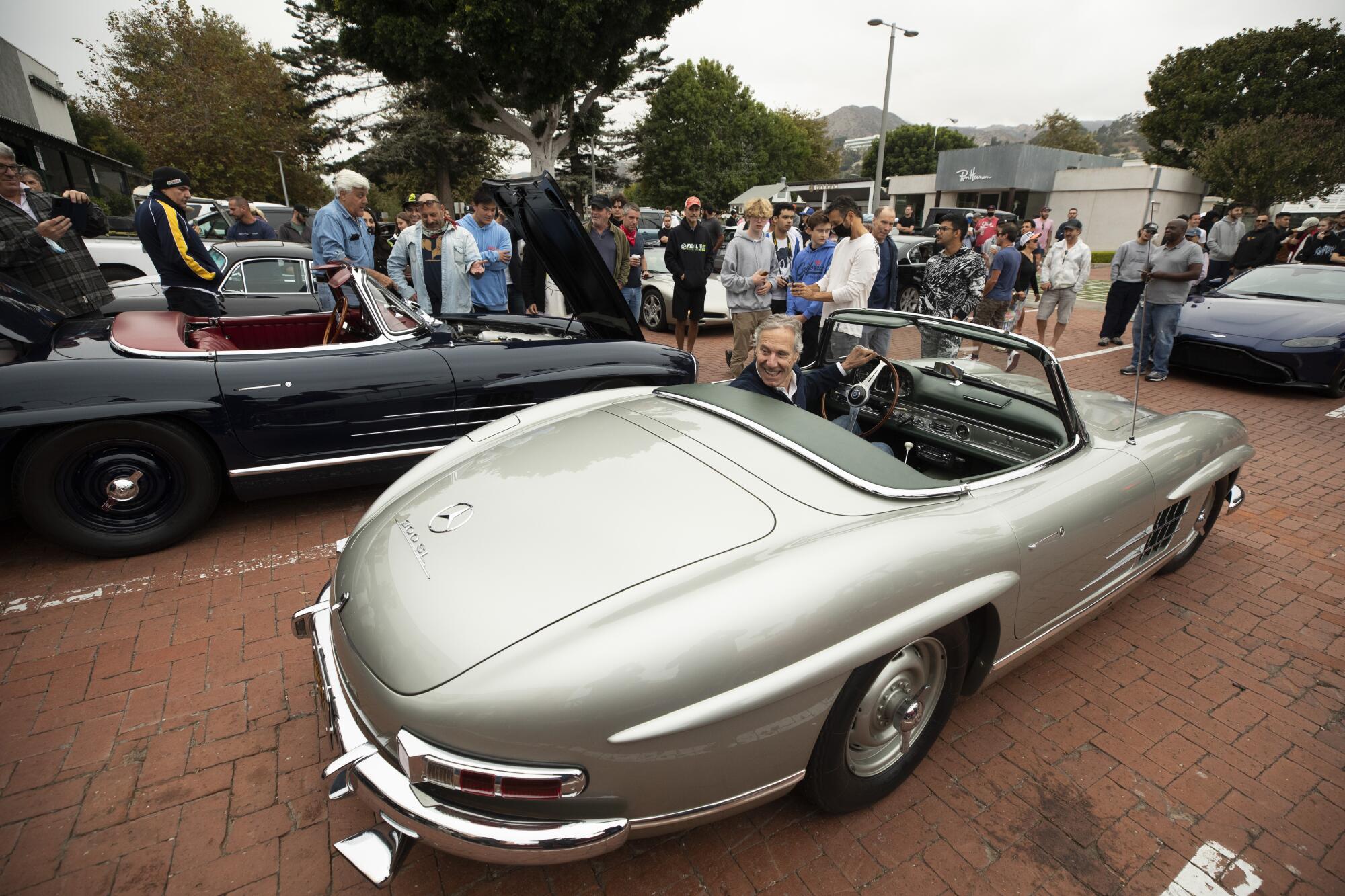
But security officers are manning the gates — keeping out car enthusiasts. Sheriff’s deputies are ticketing drivers for minor infractions, like not having a front license plate. The area feels tense, and drivers seem angry.
Matt Farah, host of the “Smoking Tire” podcast, is angry, too.
“They are selectively enforcing these rules, at a whim, closing off parking lots because of the type of people going there,” he complains when he arrives, shortly before 10 a.m., on a Vespa scooter. Given the difficulty in parking, he’s decided not to bring one of the many exotic cars he’s always testing.
“On Saturdays, these lots are even more slammed, but with people who have surfboards instead of sports cars. They aren’t keeping them out,” he says.
City officials say the stepped-up enforcement is needed to protect average citizens from a horde of hot-rodders — not the celebrities, but the people who follow them, says Malibu Mayor Paul Grisanti.
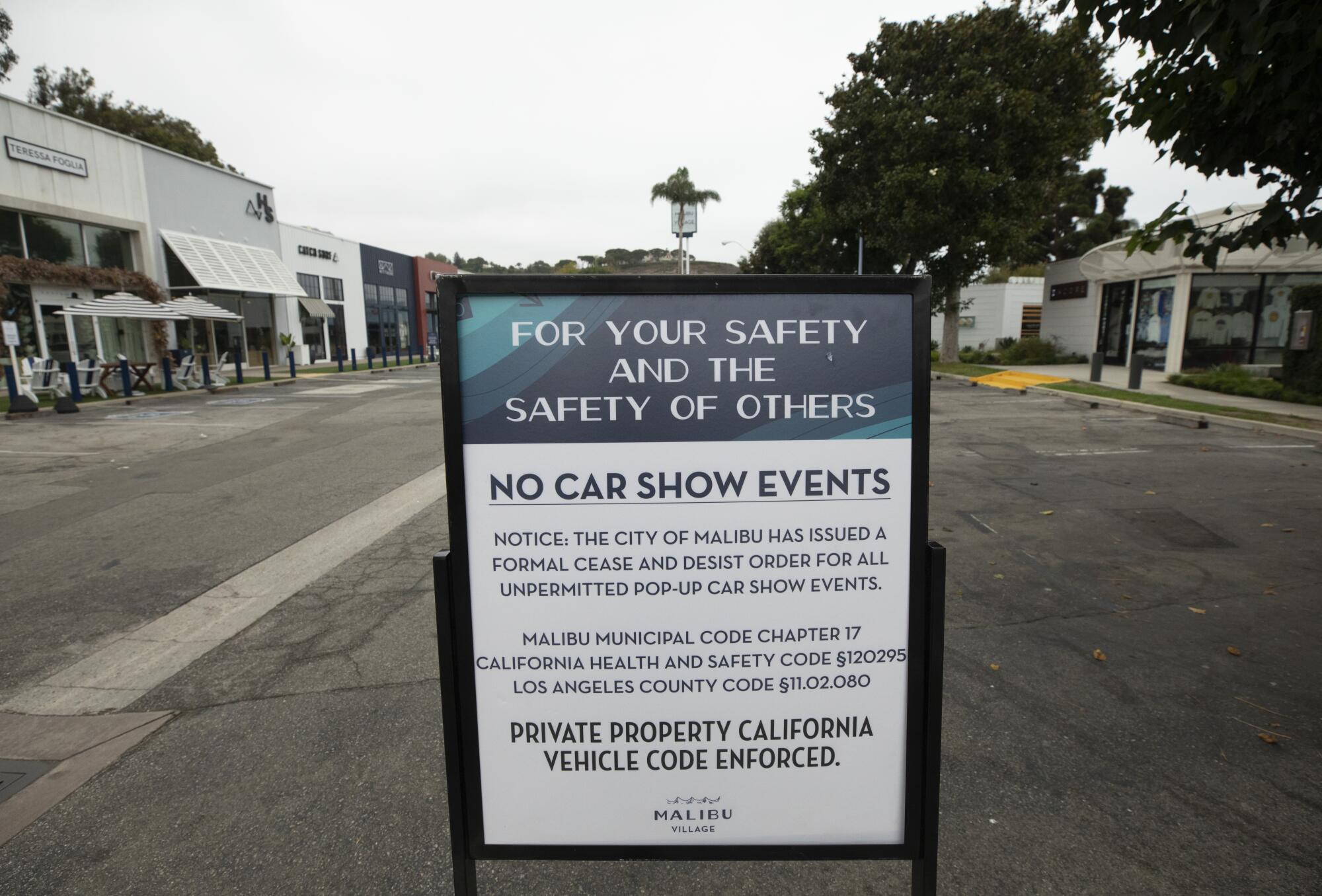
“People show up and think that because there are other cars around, they have to do something to show off — drive crazy, rev the engine up a lot, get into an accident, and make all the neighbors upset,” Grisanti says. “But we don’t need people coming to town who think they can get away with racing in traffic on a Sunday.
“They’re going to lose their Malibu privileges.”
It’s a beachfront brouhaha, pitting owners of expensive automobiles against landlords of expensive property in a collision of upper-class ego and entitlement. The fight involves some of the biggest names in the California car scene, including Leno, Jerry Seinfeld and podcasters Feresten and Farah.
For some longtime fanciers of fabulous autos, the controversy is bewildering.
“We’ve been doing this for 15 years,” Zuckerman says when he arrives, “but suddenly we’re like the MS-13 of Malibu.”
::
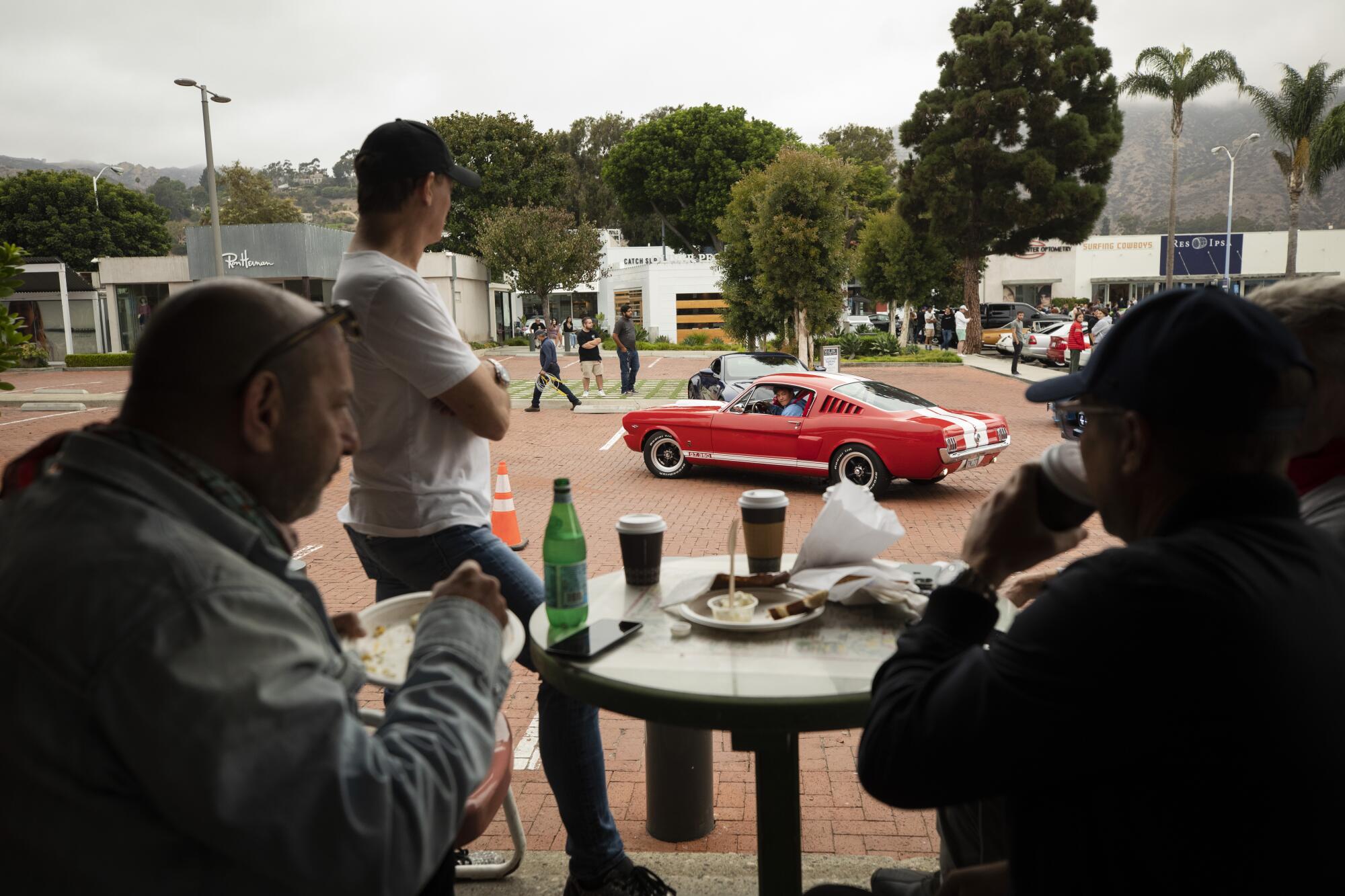
It all started innocently.
Feresten and Seinfeld, who met when the former was a writer for the latter’s eponymous TV show, bonded over their shared love of vintage Porsche sports cars. For years, they had a Sunday ritual: Meet early, drive up Pacific Coast Highway and into the Malibu canyons, then stop for breakfast at Malibu Kitchen, tucked into a corner just off Cross Creek Road.
Periodically, another Porsche-loving friend would ride along or stop for coffee. To Feresten, it was the beginning of a little club.
“Our whole goal was if we could get five or six cars to roll by while we sat here with our coffee,” he said. “But we didn’t want a car show at our personal quiet place.”
Malibu has long been a weekend destination for auto and motorcycle enthusiasts. Manufacturers often introduce their new machines by leading the motoring media on drives through the Malibu hills, along Mulholland Highway and the roads connecting Topanga Canyon, Malibu Canyon and Kanan Dume Road.
The city of Malibu appeared sanguine. For years, the city tolerated “Cars and Coffee” events in the Trancas Country Market and in the parking lot at Paradise Cove. There has even been an on-again, off-again car meet-up, licensed and sanctioned by the city, at the Malibu Bluffs Park across PCH from Pepperdine University.
“It used to be beautiful,” says Steven Schulman, who drives a Porsche GT2RS. “Until two years ago, it was like a secret. You could drive up and see your buddies,” he says, surveying the scene as he drinks coffee at Malibu Kitchen.
Like many similar stories in Southern California, popularity — helped along in this case by the COVID-19 pandemic — put an end to that.
Malibu has been trying to secede for decades. Parents there say their children get short shrift from Santa Monica, which says losing Malibu would be financially devastating.
By March 2020, other Malibu-area shows had closed down — at least one because of citizen outrage over noise and traffic — and so had everything else. Indoor gatherings were verboten. Parks and even beaches were closed. Golf courses, tennis courts and hiking trails were off limits.
With little else to distract them, car folks started gathering in the Malibu Village parking lots near Malibu Kitchen.
“Spike Feresten and I invented driving to Malibu Kitchen in a cool car to get coffee 20 years ago,” says Seinfeld, who later created a web series around the idea of comedians in cars getting coffee. “I’m not surprised the idea has taken over the entire city.”
In time, Feresten’s four- or five-car meet-up became a scene, with 200 to 300 cars rolling in on busy Sundays.
Then the city stepped in.
The access wars that have flared anew this summer feel as old as the rocky point at one end of the Cove and as new as the next tide.
“I was asked to look into it by the mayor,” says Lt. James Braden, the veteran Los Angeles County Sheriff’s Department officer who watches over Malibu. Braden called Feresten, Farah and other perceived leaders of the car scene and either warned or threatened them, depending on who is telling the story.
Braden says he warned them that “if they were organizing car shows,” and the resulting traffic was costing the city a lot of money, “it is going to come back to you.”
“It was that kind of thing,” he says.
Sheriff’s motor patrols started showing up. Malibu Village landlords hired private security, who erected barricades, which stay up from 7 a.m. until 10 or 11.
The unintended result: Rather than go away, car enthusiasts started arriving later in the day. The fancy-car frenzy that once started at 8 a.m. and fizzled out by 10 now began at 10 and went on well into midday.
“It’s stupid,” Miller says. “They’ve actually created the problem they said they were trying to solve.”
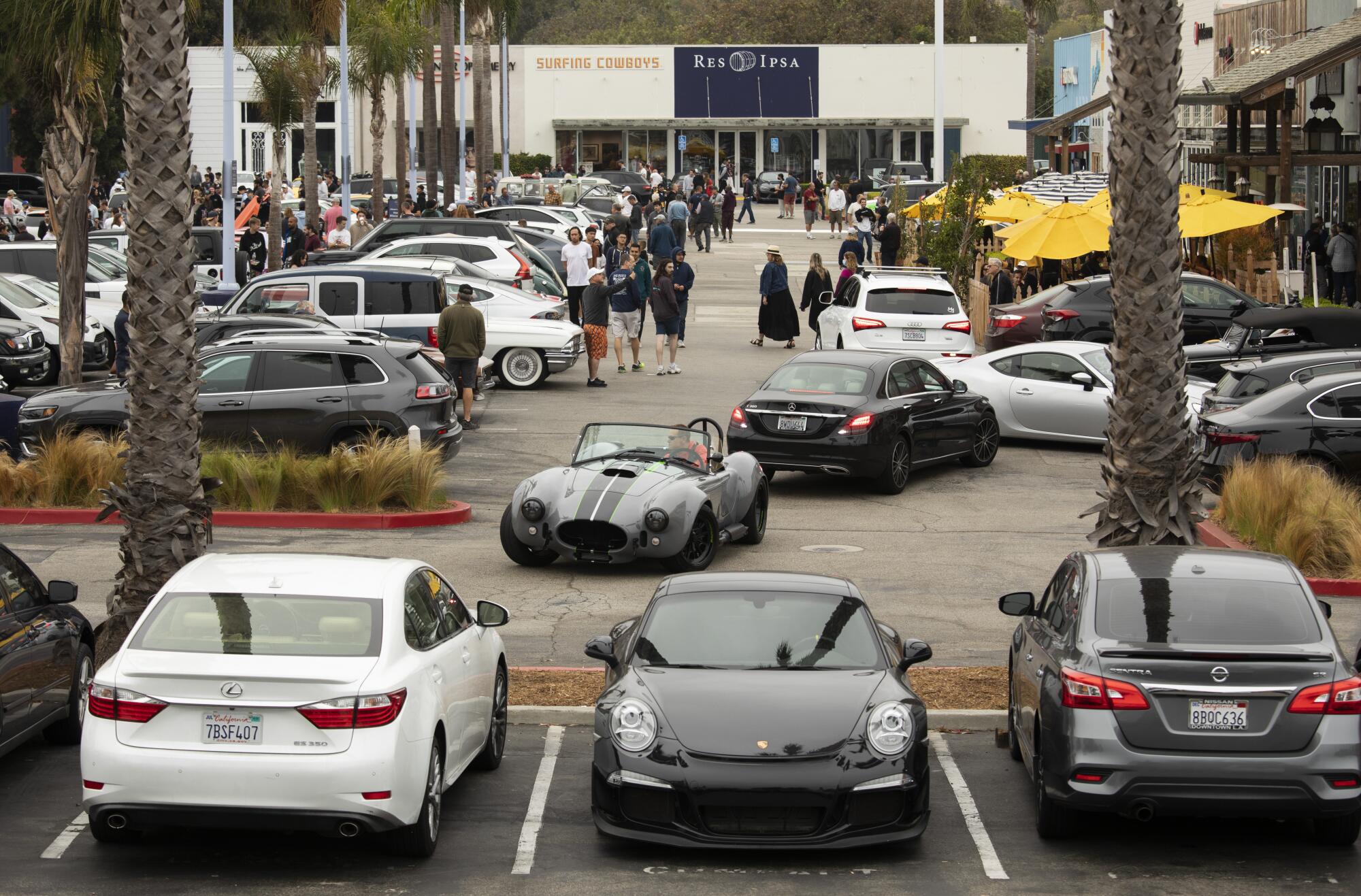
City and law enforcement officials have blamed the car gathering and its leaders for increases in traffic tie-ups, accidents and fatalities — despite protestations from the targets that they weren’t hosting a car show, weren’t inviting anyone to Malibu and had no power to make the car folks stay home or go elsewhere.
“There is no show! We’re just a few elderly men who like to go for a Sunday drive and stop for coffee and a bagel,” says Feresten, who is 57. “The more we tell people to stay away, the more they show up.”
::
At 10 a.m. the barricades come down. It’s like a dam breaking. The parking lot, almost empty at 9:45, is full by 10:10. A rush of remarkable cars — hot rods, vintage European sports cars, souped-up Japanese “tuners” and more — stream off PCH, angling for the best parking places.
The quickest and some of the gaudiest grab spaces near the front of Malibu Kitchen. A few motorists swing open their driver and passenger doors to block adjacent spaces and reserve them for their friends.
Across the parking lot, Sheriff’s Department motor deputy Justin Forbes stands with his arms folded, watching the action. He’s been on the job since the summer of 2020, when the problem started to get out of hand.
“The landlords complained that there was no parking for their customers or even their employees,” Forbes says. “So we were called in to assist.”
A shortage of affordable cars and trucks has driven record aftermarket sales of parts to make old rides faster, flashier and sometimes much louder.
Soon all of the parking places at Malibu Village are full, and the lot is a traffic jam of cars racing their engines, showing off their exotic livery and trying to find a place to park.
Half the lot can’t be accessed, because drivers failing to find legitimate parking places have left their cars in one of the two driveways. Feresten and Zuckerman must come in from the other side to take the saved spaces in front of Malibu Kitchen. Soon, they are joined by Leno and Meyer.
There, sitting on the raised porch like panelists on a game show, the automotive celebrities will hold court for the next two hours, eating bagels, drinking coffee and meeting fans.
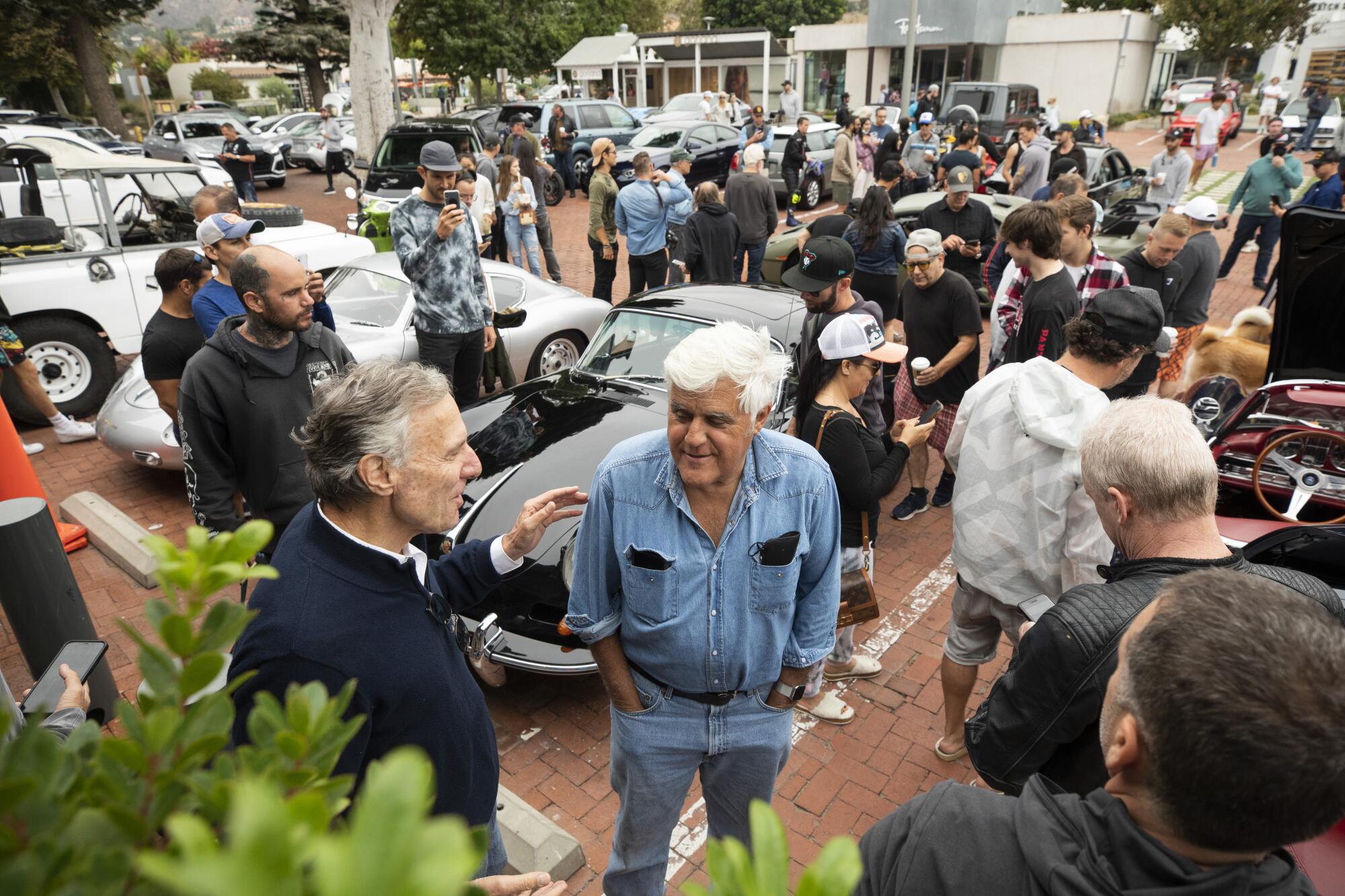
Leno, wearing his accustomed denim-on-denim, can hardly stay in his seat, so pestered is he by men, women and children who shyly ask if he’d be willing to pose with them for a picture. (He gamely responds to each, “Sure, sure. Howya doing? Where are you from?”)
Kids particularly want to talk to Feresten, to share their excitement about their favorite cars. Farah’s wife, Hanna Stein, greets a pre-teen fanboy who seems to have grown 2 feet taller, she says, since she met him on a Sunday morning a year ago. A man holding a pair of boa constrictors films himself while inviting Leno to touch his snakes.
::
Grisanti, who moved to Malibu in 1978 and has held office since December 2020, responds irritably to the idea that Feresten, Farah, Leno and others have no responsibility for the Sunday gatherings.
“They’re swell guys, but they got obsessed with making sure they get a zillion hits on their podcasts,” the mayor says. “What comes across is, if you want to see Jay Leno and Jerry Seinfeld, come to Malibu.”
Businessman and former Los Angeles mayoral candidate Steve Soboroff, whose Soboroff Partners owns and manages shopping center properties around Southern California, says he spends about $20,000 a year to post security to manage traffic at his section of the Malibu Country Mart.
“We tell people, ‘If you want to come in and get a coffee, that’s fine. But if you want to raise your hood and hang out for four or five hours, go somewhere else, or you’ll be towed,’” he says.
“It’s not Leno and those guys. They’re fine. But someone who says they went to Whole Foods and bought a stalk of celery and then wants to hang out for four hours? I won’t tolerate it.”
Despite the patrols, the problems persist. Most vocal about them are the local businesspeople who, like Malibu Kitchen’s Miller, say the situation is intolerable.
“They have ruined our business,” says Avital Stone, who identifies herself as manager on duty at the Marmalade Cafe, across the parking lot from Miller’s restaurant.
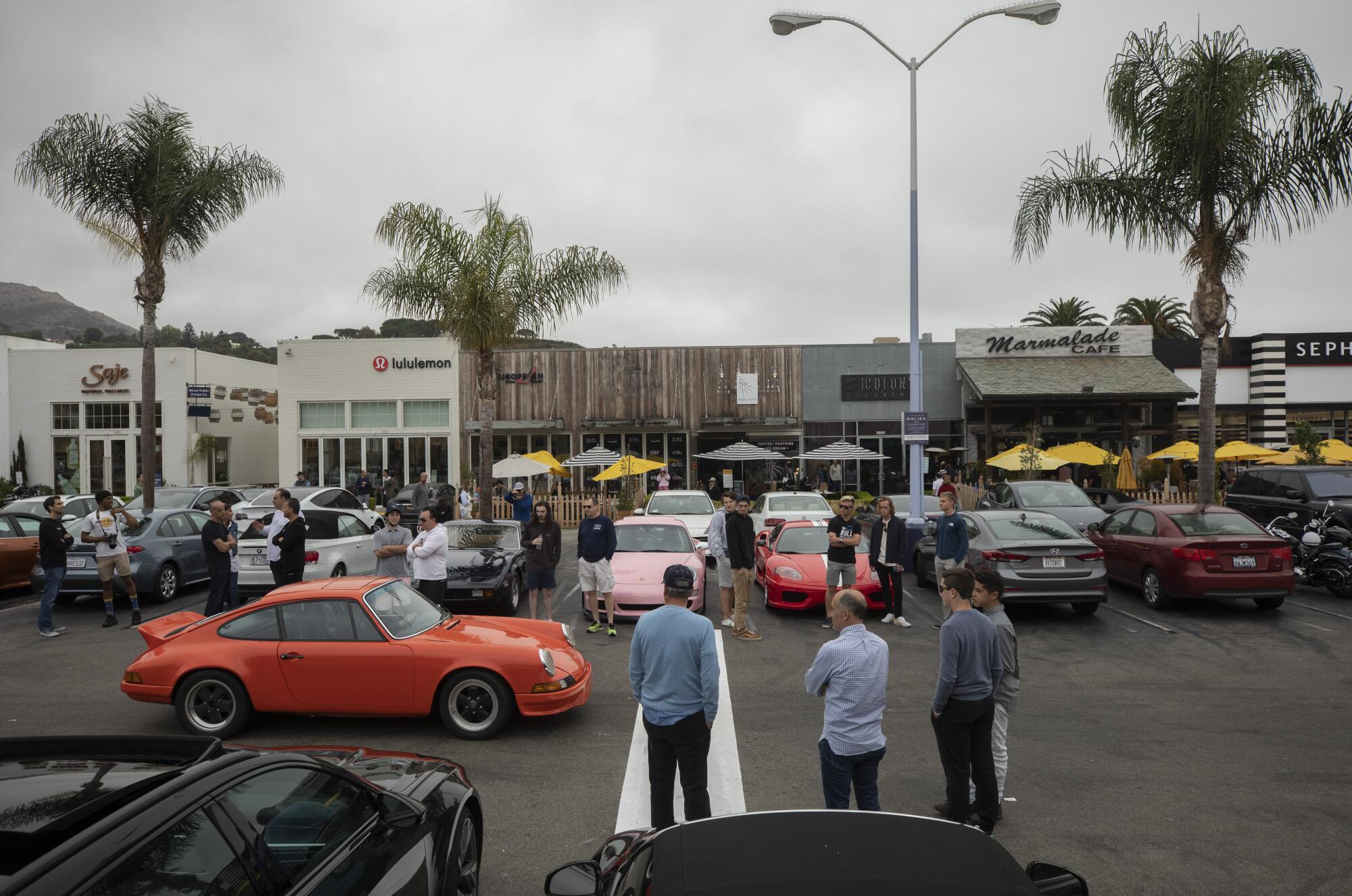
“Before 10 o’clock, our customers can’t get into the parking lot, and after 10, they can’t find anywhere to park. The car show — it’s been made clear they are not wanted here. But I truly believe that if they didn’t block off the parking lot, they’d all be gone by 10. If there was no blockade, it would be better.”
A year or more after the situation began to get ugly, no end is in sight. The cars continue to show up. The barricades stop them from entering certain lots. Businesses that are open get no business. Businesses that open later find their parking lots full. And the police presence hasn’t had any discernible effect on traffic accidents or fatalities along PCH.
The gilded swords continue to clash. Nearly everyone involved is unhappy, though different voices offer different accounts of who’s at fault.
The police and the mayor blame the car guys. The car guys blame the landlords. The shopkeepers blame both. Everyone says the Lamborghini drivers are the worst. And everyone also seems to agree that the current solution — barricading the lots until mid-morning in the hopes that the car fanciers will get bored and start going someplace else — is a failure.
The only person who expresses any enthusiasm for the late-morning schedule is Leno.
“I like it better this way,” he jokes. “I used to have to get up at 6 o’clock to get here. Now I can sleep in and still not miss anything.”
More to Read
Sign up for Essential California
The most important California stories and recommendations in your inbox every morning.
You may occasionally receive promotional content from the Los Angeles Times.
